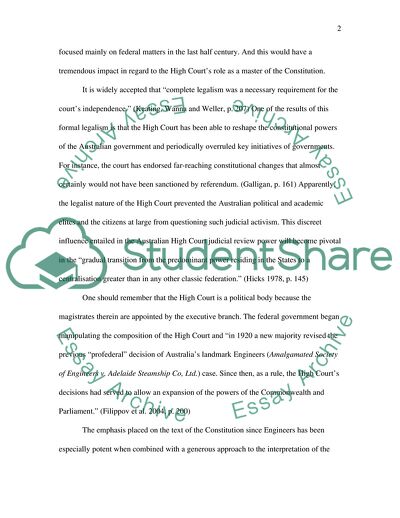
- Home
- Free Samples
- Premium Essays
- Editing Services
- Extra Tools
- Essay Writing Help
- About Us
- Studentshare
- Subjects
- Miscellaneous
- Australian federalism has transformed the High Court from interpreter to master of the constitution. Discuss this statement with respect to the division of powe
Australian federalism has transformed the High Court from interpreter to master of the constitution. Discuss this statement with respect to the division of powe - Essay Example

- Subject: Miscellaneous
- Type: Essay
- Level: Undergraduate
- Pages: 4 (1000 words)
- Downloads: 0
- Author: kkilback
Extract of sample "Australian federalism has transformed the High Court from interpreter to master of the constitution. Discuss this statement with respect to the division of powe"
minent jurists, that its task was fundamentally legal – namely, the interpretation of an imperial legislative enactment, in this case the Constitution. (p. 207) The idea is that the court merely declared or interpreted the law and that law-making was a responsibility confined to parliament. Previously, the High Court also interpreted the Constitution as providing the separation of judicial power only and not until the Dignan’s case that the Court considered and ruled on the nature of separation of powers between the legislature and the executive – an American concept.
(Patapan 2000, p. 157) The framers of the Australian Constitution followed the American model closely. They intended the High Court to be responsible for determining the meaning of the Constitution and adjudicating the high-level disputes involving governments. (Galligan 1995, p. 161) However, unlike the American Supreme Court, which has been concerned primarily on bill of rights issues, the High Court constitutional work has remained focused mainly on federal matters in the last half century.
And this would have a tremendous impact in regard to the High Court’s role as a master of the Constitution. It is widely accepted that “complete legalism was a necessary requirement for the court’s independence.” (Keating, Wanna and Weller, p. 207) One of the results of this formal legalism is that the High Court has been able to reshape the constitutional powers of the Australian government and periodically overruled key initiatives of governments. For instance, the court has endorsed far-reaching constitutional changes that almost certainly would not have been sanctioned by referendum.
(Galligan, p. 161) Apparently, the legalist nature of the High Court prevented the Australian political and academic elites and the citizens at large from questioning such judicial activism. This discreet influence entailed in the Australian High Court judicial review power will become pivotal in the “gradual
...Download file to see next pages Read More
- TERMS & CONDITIONS
- PRIVACY POLICY
- COOKIES POLICY